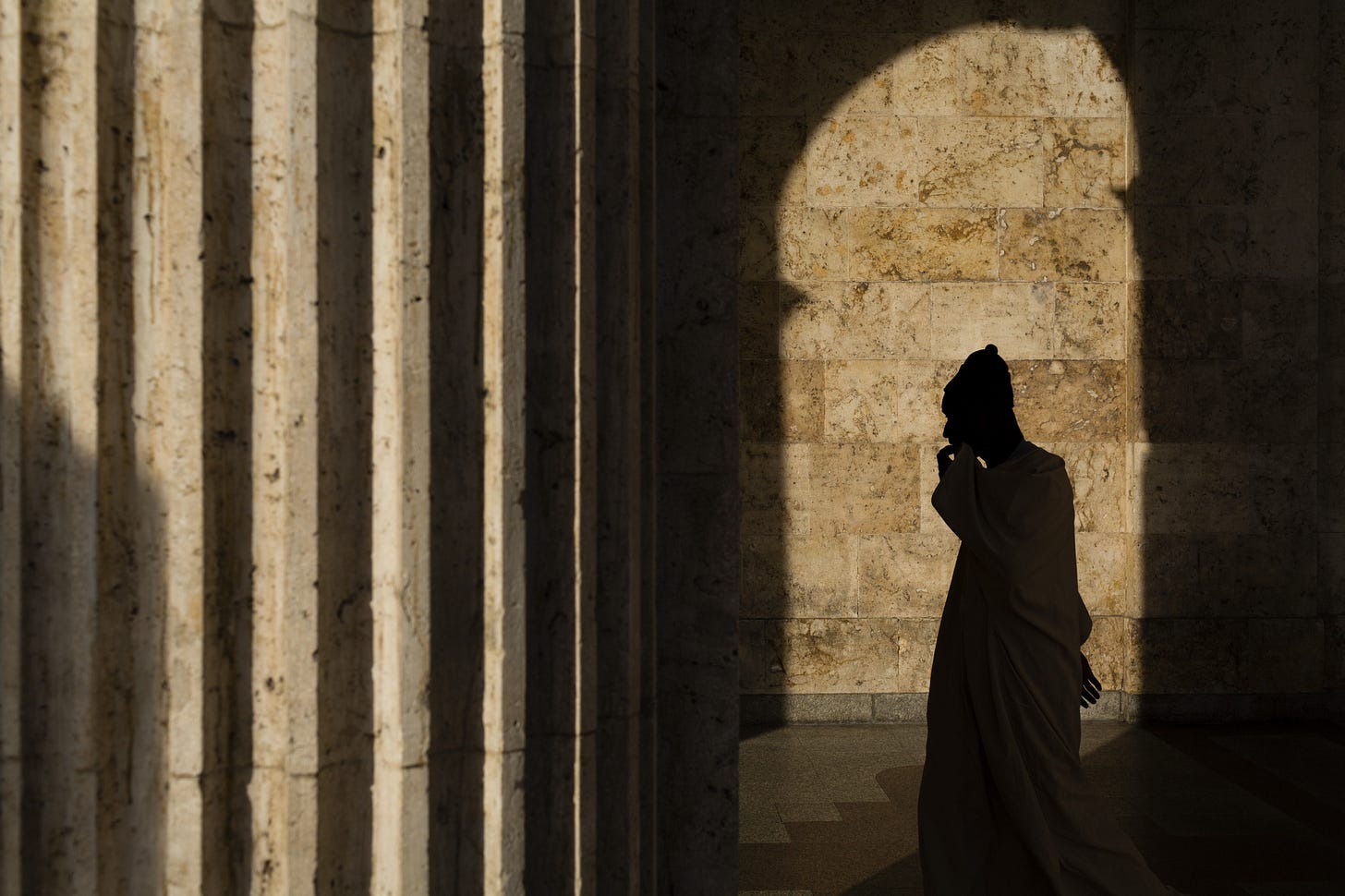The Lightness at the End of the Tunnel
You've been feeling heavy long enough. Step into the lightness.
Photo by TheDigitalArtist on Pixabay
Mum always said life was like a shit sandwich: everything seems fine on the surface, but if you dig a little deeper it turns out it’s actually horrible. But if you dig much deeper it turns out everything’s basically fine again.
It’s not Forrest Gump, but I think this is one of the truest things I’ve ever heard. Depending on your temperament you may be cheerful or despondent most of the time, but either way a lot of the ugliness of life is hidden from you. You’re blissfully unaware of the depths of your own narcissism and selfishness, and you probably don’t know what you’re capable of at your worst. You also have no idea how messed up the people around you are, because they’re all working around the clock to keep it hidden from you. Surface interacts with surface.
On a global level, no matter how cynical we are or how many conspiracy theories we subscribe to we have no idea of the true ugliness of reality simply because no-one knows what’s really going on. We don’t know what’s said behind closed doors in the corridors of power, we don’t hear about every single fire, famine and flood that besieges the ignored countries of the world, we can’t describe the supply chains that brought us all our possessions and we’re largely ignorant of the chains of cause and effect that go into social unrest, government crackdowns, riots, covert operations, arrests, crime statistics and entrenched poverty.
This is why my sister says ‘Why do I ever talk to you?’
Photo by Kan Ayman on Unsplash
The good news: most innocence has darkness lurking behind it, but the reverse is also true. What ends up as an evil often starts out as a misdirected incentive, a mistaken core belief or a lack of fulfillment in a specific area. Greed and laziness are often described as sins, but are they? Do they even exist? Or are they just inaccurate labels for the observed results of unobserved issues?
Even if you take for granted that people are arrogant, selfish, egotistical, uncooperative and violent, they still find ways to work together that produce mutually beneficial results. They identify flaws and work on them. They practice self-development. They succeed in being better parents than their parents were.
Even better than this, when people let you down — and they will — there are constants to rely on. We’re surrounded by nature. God is in His heaven. Suffering has meaning. Everyone and everything around us partakes in a unity that supersedes the separations and divisions that torment us.
This is the realm of the light. I’m not talking about light as opposed to dark here. I mean light as opposed to heavy.
The meaning of life has very little to do with weightiness or profundity. It’s right there in the play and interplay of music — all those James Brown songs that refer to nothing but themselves. The meaningful meaninglessness of dancing and swimming. Directionless rambles, whether they’re walks in the woods or Norm Macdonald anecdotes. The feeling of breath entering and leaving the body. These experiences don’t negate the evil and suffering in the universe, but they’re not negated by them either. They’re an affirmation of the fundamental goodness of life, a refusal to let misery and aggression have the last word.
The lightness/heaviness duet is one of life’s most fundamental yin-yangs. Our lives are both darkly serious and a bit ridiculous, and which of the two you choose to emphasise depends on your personality and the situation. Dancing between the two means avoiding getting trapped in extremes: too little heaviness and you become superficial, too little lightness and you become morose.
SO BACK TO THAT SANDWICH
Photo by Miguel Bruna on Unsplash
The movement of life is down — down through the sandwich, from light to heavy to light again.
The lightness of the top layer is an unearned lightness, a glibness, a refusal to acknowledge the depth of suffering in the world or examine how you might be contributing to that suffering. Weightiness and profundity are useful tools for pulling people with too much lightness in the direction they need to go: down. Naturally most people aren’t going to seek this depth out voluntarily — that’s what life experience and suffering are for.
So you arrive at the middle layer, full of suffering, confusion and despair. People who are stuck here become cynical, overburdened, anxious, frustrated. Unable to trick themselves into the denial practised by the people on the top layer, they may unconsciously turn to the emotional denial of depression to numb them to just how horrible things are. At worst, they rebel against life and become violent.
All the great religions and philosophies acknowledge the existence of the middle layer without getting stuck there. The Bible describes both human evil and the incomprehensible suffering of the non-human world as the consequence of sin, then moves straight on to the antidote. And the entire basis of Buddhism is ‘Life is full of disappointment, sickness and death. What now?’
Every religion responds to ‘What now?’ differently, but there’s a common feature to the answers which you also find in psychotherapy: the only way to beat life’s heaviness is to recognise it and lean into it. Instead of spending your life running from the abyss, you stare into it and face it down. Yes, life is hard, is that all you’ve got? Yes, everyone’s in it for themselves, is that all you’ve got? Yes, I’m as bad as the rest of them, what else have you got?
Photo by Nicola Fioravanti on Unsplash
This existential staredown was the Buddha’s only option once his encounters with the middle layer of life blew away his previous top-layer complacency. And the consequences of avoiding the staredown are illustrated in Chuang Tzu’s story about the man who decides to run away from his own shadow. He thinks that if he runs fast and far enough the strange shape will eventually vanish, but it never does and he eventually dies of exhaustion. The moral: if the man had just sat down in the shade his shadow would have vanished instantly.
After you’ve sat in the shade for a while you realise that the darkness is a lot less frightening than you thought, and even when you can’t manage it yourself you have a Helper who can absorb the worst of it for you. Realising that everything’s terrible but it’s all OK anyway, you finally access the genuine lightness that makes up life — the bottom layer of the sandwich.
This is the layer of faith in a God who knows more than you do, trust that everything’s going to be alright, acceptance of suffering, gratitude, the ability to be present to the “grace in the moment”. The tapestry on the other side of the tangled mess of threads, the sculpture that can only be created by the painful blows of the chisel.
It’s a shame people usually leave out the part where this layer’s a fun place to be. It’s the home of the Beatitudes’ easygoing attitude, the “water into wine” party, the go-with-the-flow attitude of Taoism, the eccentrics in the Chuang Tzu stories who laugh at funerals and want to be left alone to drag their tails in the mud, the smiling face of the Buddha. ‘Come to Me, all you who are weary and burdened, and I will give you rest…For my yoke is easy and my burden is light.’
TALKING RIVERS, GLASS BEADS AND DEAD COMPOSERS
Photo by Chris Chan on Unsplash
Hermann Hesse is really, really good on lightness. In Siddhartha one of the main things the title character learns from his teacher, the river, is the art of taking things lightly: whenever he’s preoccupied or burdened by something its playful lapping and gurgling sounds to him like laughter. And The Glass Bead Game features a monologue on “cheerful serenity” in the face of suffering that I’ve quoted at length in a political piece I hope to finish between now and 2030.
But Hesse really hammers the point home in Steppenwolf, which features page after page of Ecclesiastes-style tirades on the evils of life only to keep undercutting itself with no-nonsense advice, Alice in Wonderland-style surrealism and practical jokes. In one hallucinatory passage Harry Haller, the Steppenwolf, dreams he meets his hero Goethe. He quickly discovers that the dead writer doesn’t really care what Harry or anyone else thinks of what he produced while he was alive:
You are taking old Goethe far too seriously, my lad…We Immortals don’t like taking things seriously, we like to have fun. Seriousness, my lad, is a function of time. It arises — this much I’ll divulge to you — when the value of time is overestimated…But, you see, there is no time in eternity. Eternity is an instant, just long enough for a prank.
Later on Harry meets Mozart, who cheerfully affirms the middle layer of the sandwich: ‘Life is always terrible. We are not responsible for things, yet we have to answer for them. Just by virtue of being born we are guilty. You must have enjoyed a strange kind of religious education if you didn’t know that’.
When the composer notices that his words have put Harry into a funk, he laughs at him then yanks him up into outer space, the realm of the Immortals, where the frustrations of life are forgotten in the face of the stars’ glacial equanimity: ‘It was a bitterly sharp, icy cheerfulness that I felt penetrating my being like cold steel, and it made me want to laugh in just as bright, uninhibited and unearthly a manner as Mozart had done’.
Harry soon comes back down to earth, but later he meets Wolfgang again and our classical friend plays him a Handel piece on a scratchy wireless set. And as the hopelessly inadequate technology mangles the beautiful piece Mozart neatly synthesises the middle and bottom layers of the sandwich:
What you are hearing now…is not just Handel as violated by the radio, a Handel who even in this most abysmal of guises remains divine — no, what you are hearing and seeing, Sir, is at one and the same time an excellent metaphor of all life. When listening to the radio you are hearing and seeing the age-old conflict between ideas and appearances, between eternity and time, between things divine and things human…With its technology, its frantic activity, its unrestrained expediency and vanity [the radio] will intrude everywhere between idea and reality, between the orchestra and the ear. The whole of life is like that, young man, and we have no choice but to accept the fact and — if we have any sense — laugh about it.
(I think it was Oscar Wilde who said ‘We’re all listening to a hundred-year-old radio set, but some of us are tuned in to Handel’.)
Finally, observing that the serious-minded Harry is willing to do anything — kill, scourge himself, face execution — except lighten up, Mozart instructs him: ‘You are to understand life’s humour, the gallows humour of this life…You must learn to listen to life’s damned radio music, to respect the spirit that lies behind it while laughing at all the dross it contains’.
Gallows humour, good music and a light touch — sounds like a good mix to me. Good recipe for the bottom layer of a shit sandwich.









"Be of good cheer, for I have overcome the world"